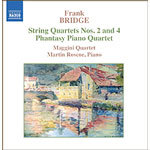
Bridge: Phantasy / String Quartets Nos. 2 and 4
 $25.00
Low Stock
add to cart
$25.00
Low Stock
add to cart
FRANK BRIDGE
Bridge: Phantasy / String Quartets Nos. 2 and 4
Martin Roscoe (piano) / Maggini Quartet
[ Naxos / CD ]
Release Date: Sunday 17 April 2005
Should this item be out of stock at the time of your order, we would expect to be able to supply it to you within 2 - 5 business days.
"The Magginis complete their Bridge cycle in distinguished style"
- Gramophone Magazine Recording of the Month May 2005
- Gramophone Magazine Recording of the Month May 2005
1001 Classical Recording you must hear before you die (1901-1950)
"An appealing programme ideally complementing the Maggini/Naxos CD of quartets 1 and 3"
- MusicWeb April 2005
"Best known for being the teacher of Benjamin Britten (who loyally admired and championed his music), Frank Bridge is a composer who really rewards his listeners. Chandos has been doing Bridge's orchestral music proud thanks to the advocacy of Richard Hickox, and almost in parallel the Maggini Quartet and Naxos have been bringing the chamber music to a wider audience. And it is Bridge's chamber music that provides the rare opportunity of being able to follow a composer's musical development throughout his career. This outstanding disc gives a glimpse of Bridge at three important times in his life: the Phantasy Piano Quartet of 1910 standing as one of his earliest chamber-music successes; the Second String Quartet (whose second movement features on the cover CD) a work from the First World War representing a new maturity; and, from 1937, the Fourth Quartet, a powerful work from Bridge's last years. At Naxos price, well worth acquiring."
(Gramophone)
"Naxos continues its valuable Bridge series with yet more superbly performed chamber works. It is apparent from the start that these are muscular, stimulating pieces that are well worthy of revival. An intelligent feature of the programming is the juxtaposition of early and late pieces, as in the earlier release of Quartets 1 and 3, and so here with 2 and 4 we get a clear picture of Bridge's development as a composer, particularly how his musical language altered quite drastically.
What comes across strongly with the Quartet No. 2 is the ardent energy of the first movement, launched by the first violin without prelude or preamble. A strong second subject is given over to Bridge's own instrument, the viola, and typifies the lyricism of works of this period, which Andrew Burn's liner-note rightly says come into the orbit of Delius around this time. Indeed, he also points out that there is cross-referencing of thematic material from Bridge's major orchestral work of the same year, Summer, in the quartet's andante con moto. Overall, there is a breezy, outgoing confidence and mastery of material throughout this piece, which Burn refers to as 'undoubtedly Bridge's first chamber masterwork'.
The contrast with his Quartet No.4 couldn't be greater. Here the musical language has taken on a more dissonant, chromatic nature that clearly links it to central European trends, particularly the Second Viennese School. Burn points to the score's various markings of 'impetuoso', 'frenetico', 'agitato' as a clue to its character and one senses a distinct unease and sense of anxiety in the Bergian harmonies. The first movement's second subject, once again on viola (1'50), is more traditional and lyrical, but cannot dispel this impression. The short second movement minuet, with its wispy trills, obsessive little rhythms and angular melodies, is reminiscent of Schoenberg's Second Quartet and parts of Berg's Lyric Suite. If this trend worries you, the finale dispels what the first two movements have created. After a somewhat pensive opening, the material echoes his earlier style, more tonal, lively and ebullient, ending with affirmative confidence. As a whole, I find the piece the more satisfying of the two, but there is no doubt that it is worth hearing them side by side, especially in performances so persuasive and imaginative.
The short Piano Quartet is one of his many excursions into the phantasy form and is the earliest work on the disc. It is hardly groundbreaking in its originality, but is impossible to dislike and makes an excellent foil for the two quartets.
Production values are high, with superb recording quality from the much-favoured Potton Hall and scholarly notes. Another winner."
-- Tony Haywood, MusicWeb, 22 March 2005
Tracks:
Phantasy, Piano Quartet in F sharp minor
String Quartet No. 2 in G minor
String Quartet No. 4

